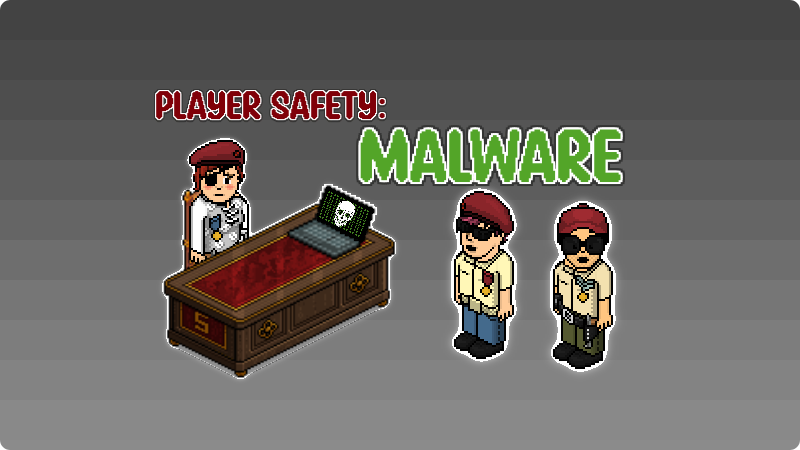
Written By: -Grogu, Hartlam & ChristianM.0498 / Graphics By: Anna.Marie97
What is Malware?
While playing Habbo or spending time online, there are multiple threats to your online security, one of the most dangerous to your device is malware. This is a prominent and growing problem for internet safety, as in recent years malware showed up in 40% of all data breaches, which was 30% more than the year before! Due to the problem becoming a bigger threat, you may have heard about malware before, such as in the news. So those playing online must have a good understanding of this topic and know how to protect themselves from it, which we aim to help with in this Player Safety article!
Malware and Viruses
A virus is a malicious piece of code that is capable of copying itself and typically has a detrimental effect on one’s device, usually either corrupting their system or destroying their data. Computer viruses can be expressed in many different ways such as adware, malware, spyware, ransomware, and so much more. As technology advances, more and more malicious actors are finding ways to infect and destroy sensitive personal and company data. Malware specifically is shorthand for malicious software, which is usually installed or permitted by the victim. Malware is typically where a user installs suspicious software from a not so reputable source, that then infects the victim’s computer in different ways. An example is when you download a trusted program from a sketchy or untrustworthy website, which usually ends in some malicious individual infecting your system with viruses such as keyloggers or ransom events – both of which could cause great harm to your system.
A ‘computer virus’ is a general term used to describe any malicious threats that intercept your device by bypassing a device’s security and then spreads from one device to another – to cause maximum damage to players online. When playing online, these viruses present a significant and usually undetectable threat to your safety. Simply put, computer viruses spread across devices to damage and corrupt your data and software.
‘Malware’ is a more specific term under the Virus umbrella which is shorthand for malicious software. This is where someone wants to infect or corrupt your device using a malicious program or file, such as downloading a file which has malware within it that then goes on to damage your device.
Examples of Malware
Malware is shorthand for “Malicious Software” and covers a wide variety of different things that could also be considered malware. There are several widely known terms such as:
- Ransomware – Ransomware is where a malicious individual or group of individuals seize your data for a monetary value. Typically, you will know if you were attacked because they will usually lock you out of your device entirely. Your data held will usually be considered valuable to you and they will demand a high price for you to retrieve it (usually in untraceable form(s) of currency)
- Keyloggers – Keyloggers are usually less known to the user when infected and usually “log” your keystrokes so the malicious party can see what you type or click. Keyloggers are known to usually steal information such as your login details to websites, bank information, or personally identifiable information that you want to be protected.
- Spyware – Spyware is a type of malware that does what the name says – spies on you. Spyware can contain things like keyloggers or allows the attacker to see everything you do. Leave your camera plugged in and on? Spyware might be used against you by turning on your camera remotely and seeing behind the screen when you have no idea.
- Adware – Adware is probably the most known type of malware and operates in a different manner. Take this for example, you go to a new website and Google Chrome asks you to accept notifications from that website. Not thinking, you click “Allow”, and then 5 minutes later you are flooded with pop-ups from an antivirus software telling you that you are now infected with a virus, giving you a number to call to help you get rid of the virus. Instead, a team of scammers is waiting on the other line to hopefully get sensitive data from you like your phone number, credit card information, and so much more data that you would much rather protect.
Antivirus Importance:
Antivirus software is essential to anyone who uses a computer, laptop, or mobile device – anything you use to connect to the online world. By using and managing an antivirus software you set yourself ahead of the game by protecting yourself from those nasty types of malware mentioned above. Antivirus software will detect and quarantine suspicious files or programs instantly and will notify you of their action. The Player Safety team does not endorse a specific antivirus software to use, but here are two common options for you to research:
- Windows Defender (Free)
– This one is already included in most Windows versions, simply type: “Defender” in your search bar to learn more! - Malwarebytes (Free and Paid)
Conclusion
Malware, or malicious software, is an unfortunate reality that could affect anyone in the online world. Whether it happens on your phone, tablet, or computer, you can easily become a victim of an attacker if you do not take the proper precautions to protect yourself. If the fear of malware is reaching you – it should! You should never take a mindset of “this will never happen to me” when dealing with malware as you could easily become the next victim if you are not careful. The best way to protect yourself is to utilize antivirus software and be extra vigilant when downloading software or browsing the website – don’t become a statistic.
